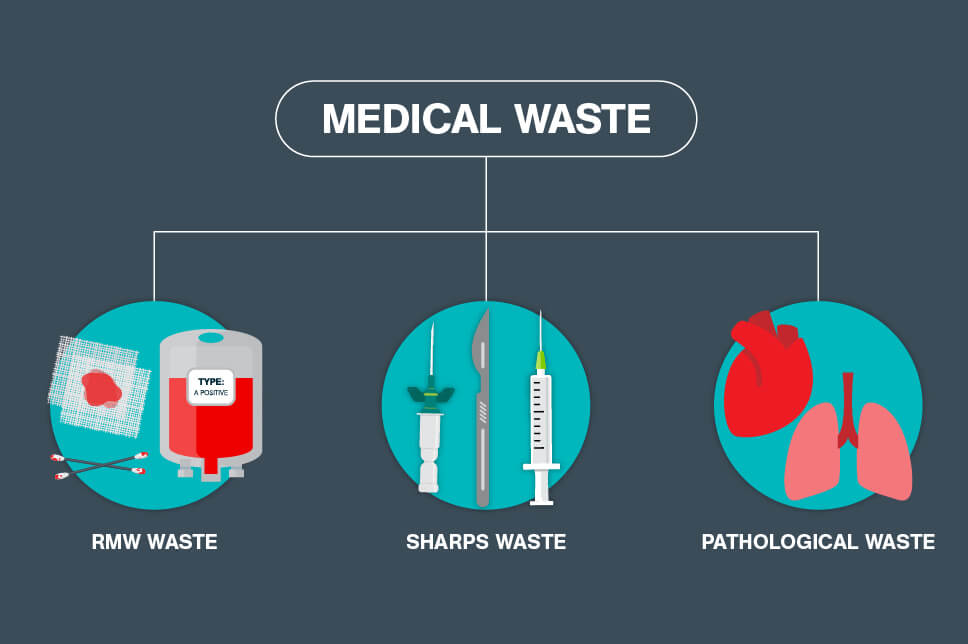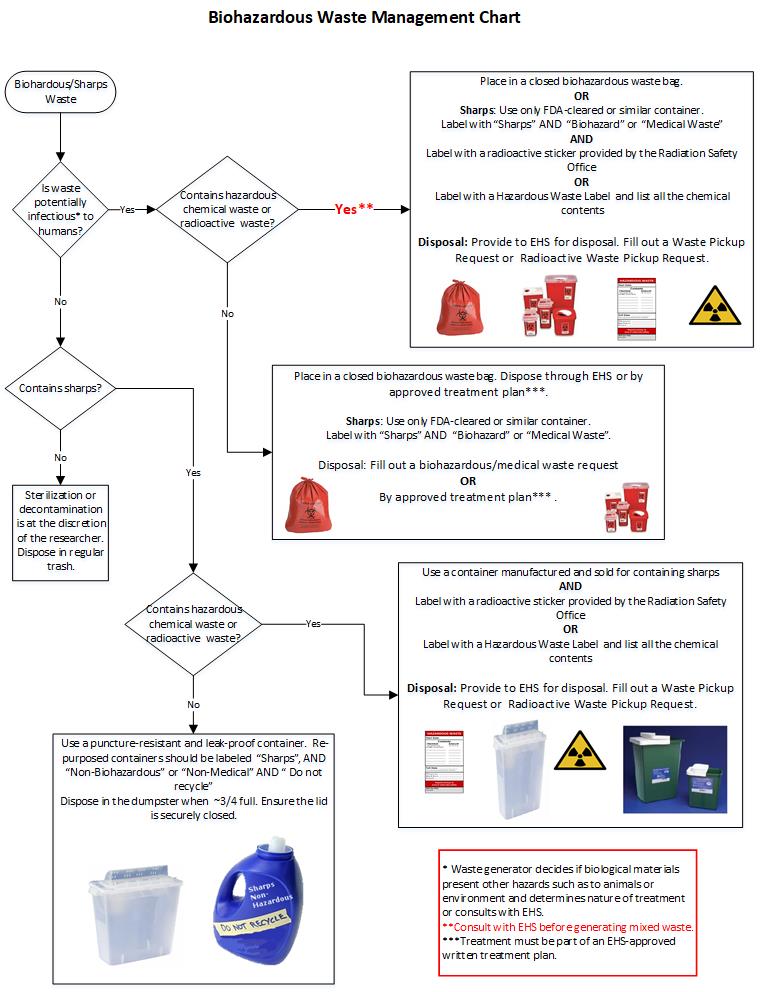Comprehensive Medical Waste Disposal Solutions: Ensuring a Healthy Atmosphere
Wiki Article
Efficient Approaches of Medical Garbage Disposal
Effective methods of medical waste disposal are critical in maintaining public health and wellness and ecological safety and security. Medical waste, including sharps, pathological waste, and pharmaceutical waste, need to be taken care of and disposed of correctly to protect against the spread of infections and protect the atmosphere. This needs adherence to rigorous regulations and the application of professional waste administration practices.Correct segregation of medical waste, safe and secure and risk-free storage space, reliable therapy and sanitation methods, and environmentally-friendly disposal alternatives are essential components of an effective medical waste disposal system. Professional waste administration services play an essential function in making certain compliance with policies and minimizing the risks related to incorrect disposal. By employing these techniques, healthcare centers can add to a more secure and cleaner atmosphere while guarding the health of the neighborhood.
Correct Segregation of Clinical Waste
Proper segregation of clinical waste is necessary for making certain the risk-free and effective disposal of these possibly harmful materials. Clinical waste refers to any waste created during medical care tasks, such as healthcare facilities, clinics, research laboratories, and research study facilities. It consists of a large range of materials, such as made use of needles, syringes, polluted dressings, expired or unused medications, and organic materials.By setting apart medical waste, medical care facilities can lessen the risk of infections, injuries, and ecological contamination. The process includes categorizing waste right into different kinds, such as sharps, contagious waste, pharmaceutical waste, and non-hazardous waste. Each type requires details handling, product packaging, and disposal approaches to stop exposure to health care workers, waste administration personnel, and the public.
To guarantee proper partition, medical care facilities should create clear standards and give appropriate training to personnel. This includes educating workers on the various waste classifications, correct packaging strategies, and the use of proper containers - WasteX Medical Waste Disposal. Furthermore, clear signage and color-coding systems can be executed to promote the recognition and segregation of different waste types
Safe and Secure Storage Space of Medical Waste
Safe and safe and secure storage space of clinical waste is vital for keeping the integrity and containment of potentially harmful products. Appropriate storage space not just secures health care employees and the general public from direct exposure to unsafe substances however additionally stops ecological contamination.To ensure safe storage space, clinical facilities ought to adhere to details guidelines. Waste ought to be saved in leak-proof and puncture-resistant containers that are classified properly - medical waste removal.
Correct segregation of medical waste is additionally essential for risk-free storage. Different kinds of waste, such as sharps, infectious materials, and pharmaceutical waste, need to be divided to stop cross-contamination. This segregation can be attained with the use of color-coded containers or containers.
Normal monitoring and evaluation of the storage area are essential to identify any kind of potential dangers or breaches. This includes checking for signs of damages or degeneration in the containers, ensuring appropriate air flow, and monitoring temperature and moisture levels.
Reliable Therapy and Sanitation Approaches

One commonly made use of therapy method is autoclaving, which involves subjecting the waste to high-pressure vapor at temperature levels above 121 degrees Celsius. One more method is incineration, which includes burning the waste at high temperatures.
Chemical sanitation is one more reliable technique for dealing with medical waste. This method involves using anti-bacterials such as chlorine substances, phenolic compounds, or hydrogen peroxide to eliminate or suspend virus (WasteX Medical Waste Disposal). Chemical sanitation is commonly made use of for liquid waste, such as laboratory samples or bodily fluids
In recent years, alternative treatment techniques such as microwave disinfection, irradiation, and biological therapy have actually likewise acquired focus. These approaches provide advantages such as decreased ecological impact and energy intake contrasted to typical methods.
Environmentally-friendly Disposal Options
In the realm of clinical waste disposal, considering environmentally-friendly options is vital. Healthcare facilities produce a significant amount of waste, including transmittable materials, drugs, and chemicals, which can present severe risks to human health and the atmosphere otherwise handled correctly. Thankfully, there are a number of environmentally-friendly disposal alternatives available that can help alleviate these risks.
One such alternative is recycling. Recycling clinical waste involves segregating and processing specific materials for reuse or repurposing. Plastics, glass, and steel containers can be reused, minimizing the need for new materials and decreasing the amount of waste sent out to land fills. In addition, some medical care facilities have actually carried out reusing programs for particular medical tools or tools, additional minimizing waste generation.
This approach involves transforming clinical waste into power via procedures like incineration or anaerobic digestion. Anaerobic digestion, on the other hand, breaks down organic waste in the lack of oxygen, producing biogas that can be utilized for electricity or warmth generation.

Advantages of Expert Waste Administration Provider
One considerable benefit of professional waste administration solutions is the enhanced effectiveness in getting rid of and taking care of of medical waste. Medical care centers generate a significant quantity of waste that consists of unsafe products, such as sharp things, contaminated things, and possibly infectious waste. medical waste removal. Incorrect handling and disposal of medical waste position serious health threats to staff members, people, and the general public. By making use of expert waste administration solutions, healthcare facilities can guarantee that all clinical waste is taken care of and disposed of effectively, lessening the threat of contamination and the spread of conditions.Specialist waste management solutions employ experienced and trained personnel who are knowledgeable about the policies and standards for clinical garbage disposal. They have accessibility to specialized devices and devices that enable them to manage various kinds of clinical waste securely and effectively. These services also have reputable procedures and methods in place to make certain that waste is set apart, packaged, WasteX Medical Waste Disposal moved, and disposed of in conformity with neighborhood, state, and government laws.
In addition, specialist waste management solutions can give health care facilities with thorough waste administration services. They can supply solutions such as waste collection, disposal, transport, and treatment, tailored to the particular requirements and needs of the facility. This removes the worry of managing waste inside, enabling medical care team to concentrate on giving high quality person care.
Final Thought
In verdict, effective methods of clinical waste disposal involve correct partition, safe storage space, therapy and sanitation, and environmentally-friendly disposal choices. These methods make sure the risk-free handling and monitoring of clinical waste, preventing the spread of infections and protecting the environment.Clinical waste, consisting of sharps, pathological waste, and pharmaceutical waste, must be taken care of and disposed of correctly to protect against the spread of infections and safeguard the atmosphere.Proper partition of medical waste, secure and safe storage, reliable therapy and disinfection techniques, and environmentally-friendly disposal options are crucial components of an efficient medical waste disposal system. The procedure involves classifying waste right into different kinds, such as sharps, transmittable waste, pharmaceutical waste, and non-hazardous waste. By making use of expert waste monitoring solutions, medical care facilities can guarantee that all medical waste is managed and disposed of correctly, minimizing the danger of contamination and the spread of illness.
Specialist waste management services utilize experienced and skilled workers who are knowledgeable about the laws and guidelines for medical waste disposal.
Report this wiki page